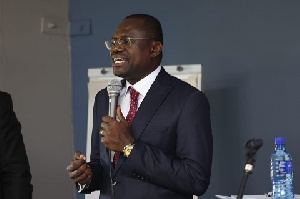General News of Sunday, 27 January 2019
Source: GNA
Nana Ato Arthur calls for support for election of MMDCEs
Dr. Nana Ato Arthur, Head of Local Government Service has urged Ghanaians to support the processes leading to the election of Metropolitan, Municipal and District Chief Executives (MMDCEs) by the year 2021.
He said the election of MMDCEs would promote local democracy by affording local people the opportunity to choose their own leaders.
He said it would also give them security of tenure and make them more accountable to their people
Dr. Nana Ato Arthur made the call in his presentation at the just ended 70th Annual New Year School and Conference at the University of Ghana.
Speaking on the topic “Thirty Years of Decentralisation: Prospects and Challenges”, Dr. Nana Ato Arthur citing from Agrawal and Ribot, 1999 said: “Decentralisation is an action by which the central administration formally cedes power to actors and institutions at the lower level in a political-administrative and territorial hierarchy”.
Dr. Nana Ato Arthur said this means the transfer of power and responsibility from the centre to the sub-national level.
“And in Ghana when you talk about sub-national level, you're referring to the regional coordinating council and the MMDAs. We are today talking about 30 years of decentralization; we are referring to the PNDC law 207, that brought this current system of decentralization into being, from 1998,” he said.
“But I want to argue that decentralization has been with us for a very long time, in fact, it is older than Ghana except that our form of decentralization like many other countries in Africa has assumed what researchers call a pendulum model.”
Dr. Nana Ato Arthur gave a historic overview of decentralization from Osagyefo Dr. Kwame Nkrumah’s era up to the passage of PNDC Law 207, which was enacted to give legal backing to decentralization.
“It is now a generation, so it is good that we are taking stock of the 30 years of decentralization that we have accepted as Ghana's tool for development,” he said.
With regards to major challenges of decentralization, Dr. Nana Ato Arthur said: “The Assemblies that are seen to be non-partisan, for me it is just theoretical. Are the assemblies non-partisan?” he questioned.
“Let us wait when the President appoints a district chief executive (DCE), and during the confirmation of a presiding member; that is where we see whether assemblies are partisan or non-partisan?” He asked.
“Let us wait when a presiding member is to be elected in our assemblies; that are where you would see whether the assemblies are partisan or non-partisan?”
Dr. Nana Ato Arthur continued: “So why are we playing ostriches? If they are not partisan? Now there is a road map that we are going to have partisan election at local level. I am all for it.”
Citing findings from a research conducted from his own constituency, Komenda Edina Eguafo Abirem (KEEA) in the Central Region, he said the statistics show that the assemblies were already partisans.
“There is a research in KEEA, my own backyard, on party affiliation of KEEA assembly elected members since 1998. The assembly that is supposed to be non-partisan; So how did we get to know that this number was New Patriotic Party (NPP); this number was National Democratic Congress (NDC) and then Convention People’s Party (CPP) and the Progressive People’s Party (PPP)?”
He said according to the research findings, in 1998; of the 36 assembly members, 22 belong to NDC, 10 NPP, four PPP.
“In 2002, the 22 elected NDC members had come down to 14, whilst NPP’s 10 had gone up to 20, PPP’s four had come down to two. You know why? From 2001, NPP was in power and now their 10 had gone up to 20, how did it happen? When it is nonpartisan? He quizzed.”
“Now it came to 2006, NDC was still coming down 14 to nine; NPP 20 to 26, PPP had come to one, from two to one. Then in 2010 NDC had won election in 2008, from nine went up to 26, whereas NPP came down from 26 to 10, and the PPP still one. Even by then, we’ve moved to 37 elected assembly members, because we were previously having 36 electoral areas, so CPP had one. It tells you that the assemblies for long have been partisans.”
The 70th Annual New Year School and Conference, was on the theme: “Building Strong Institutions for Democratic Consolidation in Ghana”.
It was organized by the School of Continuing and Distance Education of the College of Education, University of Ghana, in collaboration with the Ministry of Local Government and Rural Development.












